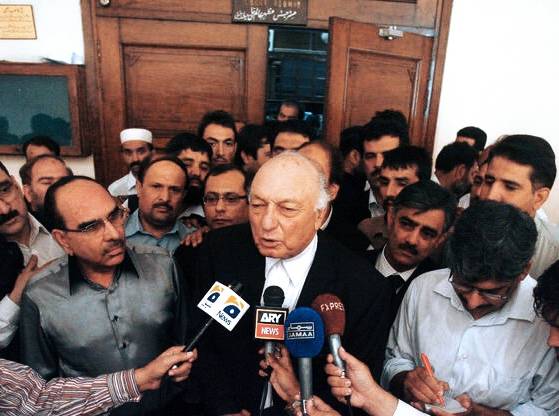
Abdul Latif Afridi got killed for no fault of his in a tribal feud – such a kind of death a progressive and humane being least deserved.
His fame was not due to his career as an advocate and becoming the President of the Supreme Court Bar Association. More than that, Comrade Latif was a left-radical leader who fought for people’s rights and the emancipation of the oppressed for the whole of his life.
He was among the top leaders of the left who emerged in the people's upsurge of the late sixties, starting his career as a progressive student leader. Lala, as he was popularly known, made great efforts to organize the working class and the peasantry in former NWFP and elsewhere. He worked with the Mazdoor Kissan Party, Communist Party of Pakistan, and Awami National Party and finally formed Quami Inqilabi Party to create a democratic-socialist society.
As a consistent democrat, he fought against all four military dictators for the restoration of democracy and constitutional republic and had to face imprisonment and hardships. Being a federalist, he continued to struggle for the rights of the oppressed nationalities and maximum provincial autonomy.
Lala was, however, dedicated to class struggle and never subscribed to narrow nationalism. Being a staunch secularist, he fought against religious bigotry and terrorism. His last speech before his murder was against the rise of the Taliban and its facilitators.
He had to quit ANP along with other leftists when Khan Abdul Wali Khan joined hands with Islami Jamhoori Ittehad. Similarly, ANP again expelled him for not concerning the Asfandyar family's hold on the party, and for supporting PTM’s peace movement in the tribal belt.
Latif Lala was a man of staunch principles on which he never made a compromise. He became a member of the National Assembly when adult franchise was granted to the tribal people for whose civil and political rights he continued to struggle.
As a lawyer, he devoted his legal practice to defending human and civil rights, labor, and peasants' rights. He was a strong supporter of press freedom, freedom of expression, and women’s and minority rights. People in distress, and missing persons’ families in particular, looked towards him for their defense.
Lala was a very passionate, loving, and pleasant human being and was admired across political divides. He was my prison mate during my long incarceration in Peshawar and Hari Pur prisons during the tyranny of General Zia-ul-Haq.
A lifelong comrade with whom I shared so much, and will miss him forever.
His fame was not due to his career as an advocate and becoming the President of the Supreme Court Bar Association. More than that, Comrade Latif was a left-radical leader who fought for people’s rights and the emancipation of the oppressed for the whole of his life.
He was among the top leaders of the left who emerged in the people's upsurge of the late sixties, starting his career as a progressive student leader. Lala, as he was popularly known, made great efforts to organize the working class and the peasantry in former NWFP and elsewhere. He worked with the Mazdoor Kissan Party, Communist Party of Pakistan, and Awami National Party and finally formed Quami Inqilabi Party to create a democratic-socialist society.
As a consistent democrat, he fought against all four military dictators for the restoration of democracy and constitutional republic and had to face imprisonment and hardships. Being a federalist, he continued to struggle for the rights of the oppressed nationalities and maximum provincial autonomy.
Lala was, however, dedicated to class struggle and never subscribed to narrow nationalism. Being a staunch secularist, he fought against religious bigotry and terrorism. His last speech before his murder was against the rise of the Taliban and its facilitators.
He had to quit ANP along with other leftists when Khan Abdul Wali Khan joined hands with Islami Jamhoori Ittehad. Similarly, ANP again expelled him for not concerning the Asfandyar family's hold on the party, and for supporting PTM’s peace movement in the tribal belt.
Latif Lala was a man of staunch principles on which he never made a compromise. He became a member of the National Assembly when adult franchise was granted to the tribal people for whose civil and political rights he continued to struggle.
As a lawyer, he devoted his legal practice to defending human and civil rights, labor, and peasants' rights. He was a strong supporter of press freedom, freedom of expression, and women’s and minority rights. People in distress, and missing persons’ families in particular, looked towards him for their defense.
Lala was a very passionate, loving, and pleasant human being and was admired across political divides. He was my prison mate during my long incarceration in Peshawar and Hari Pur prisons during the tyranny of General Zia-ul-Haq.
A lifelong comrade with whom I shared so much, and will miss him forever.

